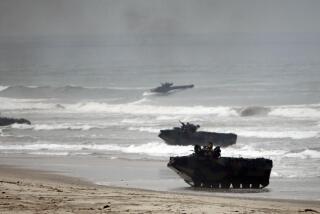Ricardo Cerros Jr. dies at 24; Army specialist from Salinas
As students at UC Irvine, Ricardo Cerros Jr. and his buddy Mike Clark often made plans to train together for the university’s taekwondo team. When they did, Clark would sometimes show up early at the gym, hoping for a head start.
But there would be Cerros, already an hour or more into the workout. Often, Clark would find Cerros on the treadmill in several layers of clothing, including a sauna suit, to make his workout more challenging.
“He would train harder than everyone,” Clark said. “He kind of had that approach with anything work-related.”
When Cerros enrolled at UC Irvine in 2005, he planned to enlist in the military immediately after graduation. But rather than choose an easy major and coast through his classes, he studied chemistry and took 22 credits some semesters, Clark said.
“He had such a strong work ethic,” he said.
After graduating in 2009, Cerros joined the Army and was a specialist assigned to the 2nd Battalion, 75th Ranger Regiment at Joint Base Lewis-McChord, Wash.
On Oct. 8, he was killed during a firefight after his unit was attacked with small-arms fire in central Afghanistan’s Logar province, south of Kabul. He was 24.
Cerros, who grew up in Salinas, southeast of Santa Cruz, had planned to join the military since he was a child, said his father, Ricardo Sr., who served in the Army himself. Another son is in the Air Force, stationed in Britain.
In high school, Cerros served for four years in the Navy’s Junior ROTC program and wanted to enlist after graduation but his father and stepmother convinced him to get a college degree first.
“I was hoping the war would be over by then,” his father said.
During ROTC in high school, Cerros was sometimes teased because he took it so seriously, Clark said.
In college, Cerros joined the campus’ taekwondo club and then helped found UCI’s team, which competed in league competitions. He was the first team member to become a black belt, said Clark, who is now the team’s coach.
The scheduled twice-a-week training wasn’t enough for Cerros, who often could be found in the gym every day. “He was just a ball of energy,” his friend said.
He said Cerros was a hard worker and strove not to beat other people but to reach his maximum potential. Because of his ability to motivate others, the team began giving out the Rick Cerros award after he graduated.
Clark, who at 6-feet-4 was nine inches taller than Cerros, remembers that he was nervous when he first met Cerros because of his intensity. But then he quickly realized he could benefit from training with him.
“When I saw him I said, ‘Oh my God, I want to work with this guy,’ ” his friend said. “Everyone around him wanted to work harder too.”
At home, Cerros also tried to take on something of a leadership role, family members said.
Cerros and his stepmother, Debra, were very close, “as if I had him myself,” she said. Any time she was worried or stressed out, he would put her at ease by saying, “No worries, Mama, no worries, I got this.”
“I can handle this,” he would say, whether it was about helping with family expenses or comforting his family about his deployment.
During their final conversation about two weeks before he was killed, he sought to calm his stepmother’s concerns, she recalled.
“No worries, Mama,” he told her.
More to Read
Start your day right
Sign up for Essential California for the L.A. Times biggest news, features and recommendations in your inbox six days a week.
You may occasionally receive promotional content from the Los Angeles Times.







